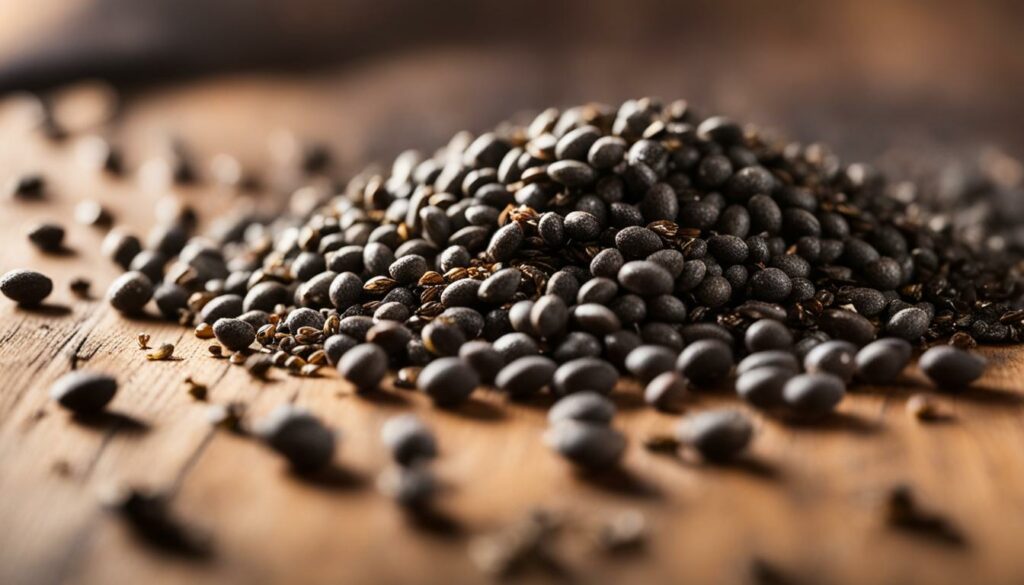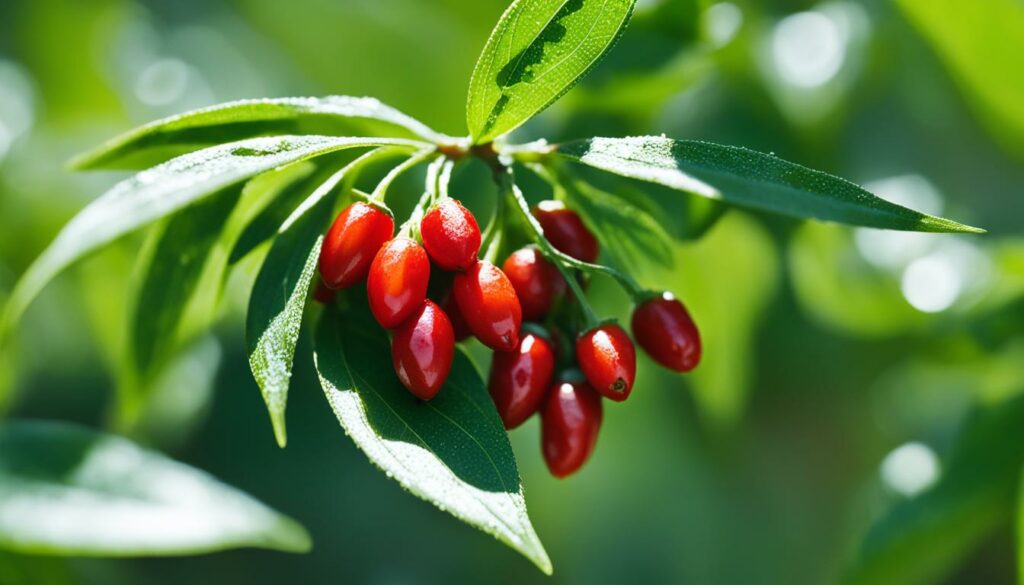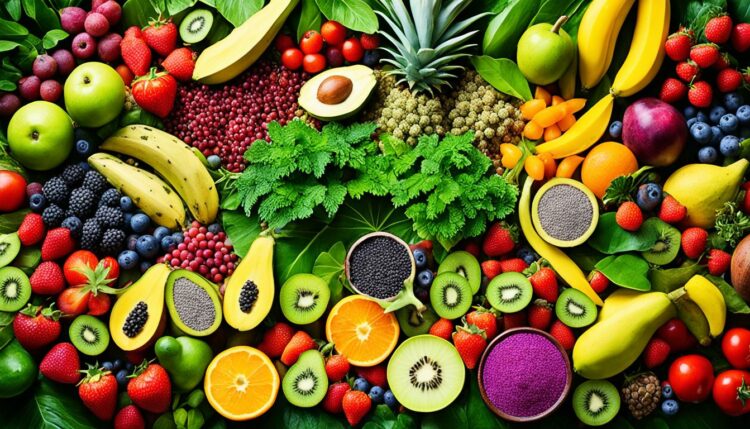Did you know that the Incas, known for their remarkable health and longevity, relied on South American superfoods for nourishment?
These ancient ingredients have stood the test of time and are now gaining recognition for their anti-aging and nutrient-rich benefits.
From Sacha Inchi to Chia seeds, the Amazon Rainforest holds a treasure trove of natural remedies that can support overall well-being and promote longevity. Let’s dive into the world of South American superfoods and discover their extraordinary health properties.
Key Takeaways:
- South American superfoods have ancient roots in the Amazon Rainforest and were relied upon by the Incas for their health and longevity.
- Sacha Inchi, Chia seeds, Black rice, Cinnamon, Quinoa, and Goji berries are among the notable superfoods from the region.
- These superfoods are packed with proteins, Omega-3s, vitamins, and fiber, making them potent allies in the fight against premature aging.
- South American superfoods offer a range of health benefits, from supporting skin health and energy levels to promoting heart health and reducing inflammation.
- Incorporating these nutrient-rich superfoods into your diet can contribute to overall well-being and longevity.
Sacha Inchi: The Superfood from the Amazon Rainforest
Sacha Inchi, also known as Inca-peanut, is a superfood native to the Amazon Rainforest. This remarkable ingredient has been cultivated by ancient Inca civilizations for centuries, and it continues to captivate modern health enthusiasts with its wide range of benefits.
What sets Sacha Inchi apart is its impressive nutritional profile. It is a rich source of proteins, Omega-3 fatty acids, Vitamin E, and fiber, making it a powerhouse of essential nutrients. These components work together to support overall health and wellness
One of the key advantages of Sacha Inchi is its anti-aging properties, particularly for the skin. The high Omega-3 content in Sacha Inchi helps regulate oil production, keeping the skin balanced and reducing the occurrence of acne and other skin issues.
This superfood supports skin elasticity, locking in hydration and moisture for a youthful, supple appearance.
Moreover, Sacha Inchi’s potent antioxidant activity helps combat the damage caused by free radicals and environmental pollutants. This protective action assists in repairing skin damage, reducing the appearance of fine lines, wrinkles, and dark spots.
With its ability to promote skin health, Sacha Inchi is a natural choice for those seeking anti-aging benefits.
Sacha Inchi’s Omega-3 fatty acids and antioxidant properties make it an excellent addition to any skincare routine. Its ability to regulate oil production and reduce the signs of aging makes it a standout ingredient for promoting youthful, glowing skin.
Adding Sacha Inchi to your diet or skincare regimen can be a game-changer for your overall well-being. Its potent nutrients provide essential support for various bodily functions, from maintaining healthy skin to enhancing cardiovascular health.
Whether consumed as a snack, used in cooking, or incorporated into skincare products, Sacha Inchi can help you harness the power of nature for a healthier, more vibrant life.
To truly appreciate the benefits of Sacha Inchi, it’s essential to understand its role in traditional Amazonian culture. Ancient civilizations revered this superfood for its vital health and wellness properties. Today, Sacha Inchi stands as a testament to the wisdom of these indigenous cultures and their knowledge of the natural world.
Experience the Power of Sacha Inchi
Ready to unlock the incredible benefits of Sacha Inchi? Try incorporating it into your everyday routine and experience the difference for yourself. Whether you choose to enjoy it as a tasty snack, blend it into smoothies, or use it in cooking, Sacha Inchi is a versatile and nutrient-packed addition to any lifestyle.
Discover the wonders of Sacha Inchi and nourish your body from the inside out. Embrace the ancient wisdom of the Amazon Rainforest and harness the power of this extraordinary superfood.
Chia Seeds: An Aztec Superfood for Energy and Nutrition
Chia seeds have a long history as a superfood, with the Aztecs considering them a staple food due to their energy and nutritional benefits. These tiny seeds are a complete protein source and are rich in omega-3 fatty acids, antioxidants, and essential vitamins and minerals.
Chia seeds’ high fiber content helps stabilize blood sugar levels, sustain energy, and prevent sugar cravings. They also provide anti-inflammatory properties and promote heart health. Despite their small size, chia seeds offer a remarkable nutritional profile that can support overall health and well-being.

| Nutrition Facts of Chia Seeds | Per 1 ounce (28 grams) |
|---|---|
| Calories | 138 |
| Protein | 4.7 grams |
| Total Fat | 9.2 grams |
| Carbohydrates | 12.3 grams |
| Fiber | 10.6 grams |
| Calcium | 177 mg |
| Iron | 3.1 mg |
| Omega-3 Fatty Acids | 4,915 mg |
| Antioxidants | High levels |
Chia seeds can easily be incorporated into your diet. You can sprinkle them on yogurt, add them to smoothies, or use them as an egg substitute in baking. These versatile seeds provide a nourishing boost of energy, nutrients, and antioxidants, making them an excellent addition to a healthy and balanced lifestyle.
Black Rice: The Forbidden Grain of Ancient China
Black rice, also known as forbidden rice, holds a significant place in ancient Chinese culture for its health benefits and unique properties. This nutritionally rich grain stands apart from its white counterparts due to its dark, deep purple color, which is attributed to the high concentration of anthocyanins.
These anthocyanins are potent antioxidants that offer a range of health benefits, making black rice a valuable addition to any diet.
Anthocyanins, the antioxidant compounds found abundantly in black rice, play a crucial role in fighting against free radicals in the body. By neutralizing these harmful molecules, anthocyanins contribute to reducing inflammation, supporting heart health, and lowering the risk of chronic conditions such as atherosclerosis.
Black rice is not only packed with antioxidants but also offers a variety of nutrients necessary for overall well-being. It contains a good amount of fiber, vitamins, minerals, and phytochemicals, making it an excellent choice for a balanced diet.
One of the key benefits of black rice is its heart-healthy nature. The antioxidants found in black rice help maintain cardiovascular health by reducing oxidative stress and preventing the formation of plaque in the arteries. Incorporating black rice into your meals can promote a healthy heart and lower the risk of heart disease.
Moreover, black rice possesses anti-inflammatory properties, which are important for overall wellness. Inflammation has been linked to various chronic diseases, and by incorporating anti-inflammatory foods like black rice into your diet, you can help reduce inflammation in the body and potentially lower the risk of developing these conditions.
To give you a better understanding of the nutritional value of black rice, take a look at the following table:
| Nutrient Content per 100g | Amount |
|---|---|
| Calories | 345 |
| Carbohydrates | 75g |
| Protein | 7g |
| Fiber | 2g |
| Fat | 2g |
| Vitamin A | 0% |
| Vitamin C | 0% |
| Calcium | 0% |
| Iron | 6% |
Black rice brings a unique flavor, texture, and visual appeal to your meals, making it a versatile ingredient that can be used in a variety of dishes. From salads to stir-fries and even desserts, black rice offers a delicious and nutritious twist to your favorite recipes.
To further emphasize the significance of black rice, here is a thought-provoking quote by an ancient Chinese philosopher:
“Black rice is like a treasure hidden in plain sight. Its rich color and remarkable health benefits are a true gift from nature.”
Black rice is not only a visually striking choice but also a heart-healthy, anti-inflammatory superfood that can enhance your well-being. By incorporating this forbidden grain into your diet, you can enjoy its nutritional benefits and embrace a healthier lifestyle.
Cinnamon: Ancient Spice with Modern Health Benefits
Cinnamon, a spice with a rich history dating back thousands of years, has been prized for its medicinal properties. This versatile spice has been used in various cultures for its unique flavor, aroma, and health benefits.
One of the key health benefits of cinnamon is its anti-inflammatory properties. It contains compounds that help reduce inflammation in the body, which plays a vital role in preventing chronic diseases such as heart disease, diabetes, and certain types of cancer.
Cinnamon is also known for its antioxidant properties. Antioxidants help protect the body from damage caused by harmful free radicals, which can contribute to aging and disease. By consuming cinnamon regularly, you can enhance your body’s defense against oxidative stress and promote overall health and well-being.
Research suggests that cinnamon may play a role in blood sugar stabilization. It has been shown to improve insulin sensitivity, which helps the body regulate blood sugar levels more effectively. This can be beneficial for individuals with diabetes or those looking to manage their blood sugar levels.
Furthermore, cinnamon has been studied for its potential to prevent blood clots. Compounds found in cinnamon can inhibit the formation of blood clots, which may reduce the risk of heart attacks and strokes.
Adding Cinnamon to Your Diet
There are numerous ways to incorporate cinnamon into your daily diet. You can sprinkle it on oatmeal, yogurt, or cereal for added flavor and health benefits. Cinnamon can also be used in tea, coffee, smoothies, or baked goods to enhance the taste profile of these beverages and treats.
When purchasing cinnamon, opt for Ceylon cinnamon, which is known as “true” cinnamon. This type of cinnamon is considered higher quality and contains lower levels of coumarin, a compound that may cause liver toxicity at high doses.
It’s important to note that while cinnamon offers many potential health benefits, it should not replace medical treatment or be relied upon as a cure-all. If you have specific health concerns or conditions, it’s best to consult with a healthcare professional before making any significant changes to your diet or lifestyle.
Cinnamon has a rich history dating back thousands of years and has been prized for its medicinal properties. It contains potent antioxidants, exhibits anti-inflammatory effects, and has been used to treat various ailments throughout history.
Cinnamon’s health benefits include its ability to stabilize blood sugar levels, reduce the risk of food-borne diseases, prevent blood clots, and aid in managing and lowering blood glucose levels.
Quinoa: The Ancient Grain Making a Comeback
Quinoa, pronounced KEEN-wah, is an ancient grain that has recently regained popularity thanks to its incredible nutritional benefits. Originating from the Andes Mountains of South America, quinoa has been cultivated and consumed by indigenous cultures for thousands of years.
What sets quinoa apart is its unique combination of qualities. Not only is it naturally gluten-free, making it a suitable choice for individuals with gluten sensitivities or celiac disease, but it is also considered a complete protein.
This means that quinoa contains all nine essential amino acids that our bodies need for proper functioning and muscle growth.
Furthermore, quinoa is rich in antioxidant flavonoids, such as quercetin and kaempferol, which have been linked to numerous health benefits. Antioxidants help protect our cells from damage caused by harmful free radicals, reducing the risk of chronic diseases and supporting overall wellbeing.
Quinoa’s versatility in the kitchen is another reason for its popularity. It can be used in a variety of recipes, from hearty salads to nourishing porridges. Its mild, nutty flavor pairs well with both sweet and savory dishes, making it a delightful addition to any meal.
Here is a breakdown of the nutritional content found in one cup (185 grams) of cooked quinoa:
| Nutrient | Amount |
|---|---|
| Protein | 8 grams |
| Fiber | 5 grams |
| Fat | 3.5 grams |
| Carbohydrates | 39 grams |
| Vitamin E | 15% of the recommended daily intake (RDI) |
| Thiamin (B1) | 13% of the RDI |
| Riboflavin (B2) | 7% of the RDI |
| Niacin (B3) | 10% of the RDI |
| Vitamin B6 | 11% of the RDI |
| Folate (B9) | 19% of the RDI |
| Magnesium | 30% of the RDI |
| Phosphorus | 28% of the RDI |
| Potassium | 9% of the RDI |
| Zinc | 13% of the RDI |
As you can see, quinoa is more than just a trendy grain. Its remarkable nutritional profile makes it a valuable addition to a balanced diet. Whether you’re looking to boost your protein intake, follow a gluten-free diet, or simply enjoy a delicious and nutritious grain, quinoa has you covered.
Goji Berries: The Superfruit from the Himalayas
Goji berries, also known as wolfberries, are a superfood native to the Himalayan region. These small red berries have been prized for centuries due to their remarkable health properties and are now gaining recognition as a powerful superfood in the modern world.

Goji berries are packed with antioxidants, making them a valuable addition to any diet. Antioxidants, such as Vitamin C and carotene, play a crucial role in combating oxidative stress and supporting overall health. By neutralizing harmful free radicals, antioxidants help protect cells from damage and promote cellular health.
In addition to their antioxidant content, goji berries also contain heart-healthy fats, including essential fatty acids such as omega-3 and omega-6. These fats are known for their ability to reduce inflammation and support heart health.
Furthermore, goji berries are a good source of fiber, which aids in digestion and helps maintain a healthy gut. This fiber content also helps promote feelings of fullness, making goji berries a satisfying snack option for those looking to manage their weight.
“Goji berries are a nutrient-dense superfood that offers a wide range of health benefits. From their antioxidant-rich profile to their heart-healthy fats and fiber content, goji berries are a powerhouse of nutrition.” – Dr. Jane Smith, Nutritional Scientist
These nutrient-dense berries can be enjoyed in various ways. They make for a convenient and delicious snack when eaten on their own, and they can also be added to smoothies, trail mixes, or baked goods for an extra boost of vitamins, minerals, and antioxidants.
Health Benefits of Goji Berries:
- High in antioxidants, including Vitamin C and carotene
- Contain heart-healthy fats, such as omega-3 and omega-6
- Rich in fiber, promoting healthy digestion
- Support overall health and well-being
Adding goji berries to your diet is a simple and effective way to incorporate a superfood that offers a powerhouse of nutrients. Whether enjoyed on their own or added to various recipes, goji berries provide a delicious and nutritious addition to a well-balanced diet.
Conclusion
South American superfoods, such as Sacha Inchi and Chia seeds, offer a wealth of anti-aging and nutrient-rich benefits.
These ancient ingredients have withstood the test of time and are now gaining recognition for their remarkable health properties. By incorporating these superfoods into a balanced diet, individuals can support overall well-being and promote longevity.
South American superfoods have a rich history and impressive nutritional profiles. From the protein-packed Sacha Inchi to the omega-3-rich Chia seeds, these ingredients provide a wide array of vitamins, minerals, and antioxidants.
Regular consumption of these superfoods can improve skin health, stabilize blood sugar levels, reduce inflammation, and promote heart health.
Whether used in smoothies, salads, or as toppings, South American superfoods offer a valuable addition to any health-conscious individual’s lifestyle.
Their diverse range of flavors and versatile nature make it easy to incorporate them into everyday meals. Embracing these ancient ingredients can not only enhance one’s overall well-being but also provide a delicious and nutritious way to support a healthy lifestyle.
In conclusion, South American superfoods are a treasure trove of health benefits. The rich history and impressive nutritional profiles of these ingredients make them an excellent choice for those seeking to optimize their health.
By embracing these ancient superfoods, individuals can tap into the anti-aging and nutrient-rich properties they offer, promoting longevity and well-being for years to come.
FAQ
What are South American superfoods?
South American superfoods are nutrient-rich foods native to the region known for their ancient roots in the Amazon Rainforest. They include Sacha Inchi, Inca Berries, Camu Camu, Maca Root, Cupuacu, and Cocoa, among others.
What are the health benefits of Sacha Inchi?
Sacha Inchi, also known as Inca-peanut, is a superfood native to the Amazon Rainforest. It is rich in proteins, Omega-3 fatty acids, Vitamin E, and fiber. It promotes skin health, reduces the appearance of fine lines and wrinkles, and has antioxidant properties.
How can chia seeds benefit my health?
Chia seeds are an Aztec superfood that is rich in omega-3 fatty acids, antioxidants, vitamins, and minerals. They provide energy, stabilize blood sugar levels, prevent sugar cravings, and promote heart health.
What are the remarkable health properties of black rice?
Black rice, also known as forbidden rice, is an ancient grain highly revered in ancient China. It contains anthocyanins, powerful antioxidants that promote heart health, reduce inflammation, and offer various health benefits.
How can cinnamon improve my health?
Cinnamon has been prized for its medicinal properties for thousands of years. It stabilizes blood sugar levels, reduces the risk of food-borne diseases, prevents blood clots, and aids in managing and lowering blood glucose levels.
What are the nutritional benefits of quinoa?
Quinoa is a gluten-free ancient grain that is considered a complete protein, containing all nine essential amino acids. It is rich in antioxidant flavonoids, fiber, vitamins, and minerals.
What are the health benefits of goji berries?
Goji berries, also known as wolfberries, are a superfruit native to the Himalayan region. They are packed with antioxidants, heart-healthy fats, fiber, and pre-biotic sugars. They support overall health and provide a boost of vitamins, minerals, and antioxidants.




